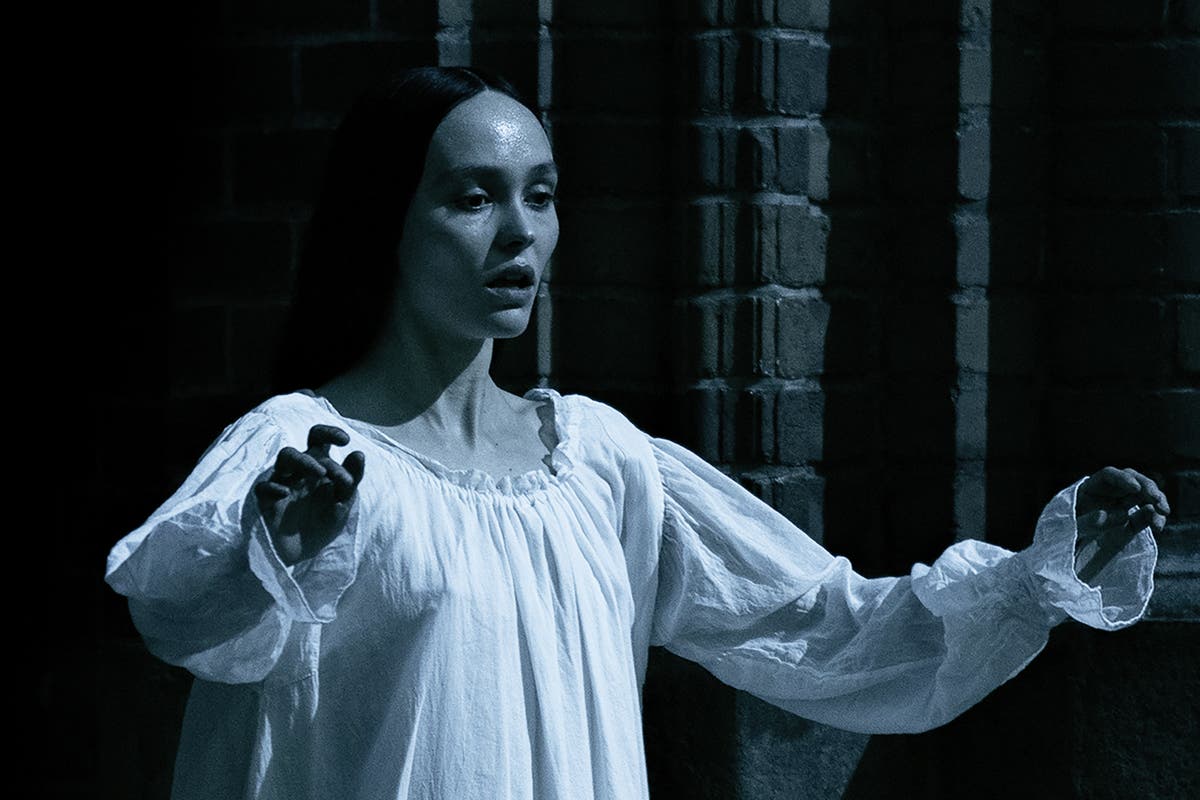In Robert Eggers’s Nosferatu, the vampire is reincarnated. He has shed his sparkle, his languid melancholy, his cobweb-speckled absurdity. He comes for you now – yes, you – as the murmuring voice in the dark, the one that calls your desires perverse and your soul unnatural. This creature feeds on shame, of both the faithful and the faithless. And he is as true to us as he was to FW Murnau, director of 1922’s original Nosferatu, or to Bram Stoker, whose novel Dracula provided the (unofficial, legally ruled as copyright infringement) source material.
“Does evil come from within us or from beyond?” asks Ellen Hutter (Lily-Rose Depp), the convulsing, hysteric target of vampiric attention. Eggers’s interpretation of the classic novel, via the classic silent film, is not only a luxurious, Gothic revelation – it’s also one of the most profoundly, seductively frightening horrors in years, all because its terrors seem to crawl right out from our own stomachs. In 1838, Ellen’s bland but well-meaning husband Thomas (a perfectly tuned Nicholas Hoult) is sent out to the Carpathian Mountains in order to facilitate the purchase of a property in his German hometown by the enigmatic Count Orlok (Bill Skarsgård).
He is, of course, a vampire. And a vampire is the ultimate vessel of sex and death. Skarsgård’s transformation into the demonically unrecognisable is too genuine a surprise to spoil here. But the wheezing rumble of his voice, and its rolled “R”s, allows him to repulse as much as he seduces. His voice seems to emanate not from his mouth, but from the walls themselves. He sucks blood not from the neck, but down on the breast, accompanied by rhythmic thrusting. It’s erotic, but not in the satisfying sense. He is an addiction that brings no pleasure.
He’s trailed always by an army of plague-ridden rats, which seem to drive seemingly level-headed folks like Friedrich (Aaron Taylor-Johnson) and Anna (Emma Corrin) Harding into apocalyptic despair. Disease is an ever-present fear, and Eggers’s Nosferatu has been a decade in the making – yet, now, in the shadow of a pandemic, its sensations feel sharper than ever. Murnau’s film, after all, was released shortly after the end of the Spanish flu epidemic.
On screen, Jarin Blaschke’s cinematography forges a visual battle between the romantic, religious ecstasy of 19th-century painter Caspar David Friedrich, and a stark, occultist, near-monochrome look that evokes Murnau’s original film. Nosferatu is about the collision of worlds, faith versus reason, as Stoker’s novel was before it. Eggers is a historian at heart, and his invocation of the 1830s is as staggeringly detailed as his Viking epic The Northman (2022) or 17th-century folk horror The Witch (2015) before it (so accurate, in fact, that its title was stylised as “The VVitch”). Linda Muir’s costumes and Craig Lathrop’s production design are equally unassailable. Here, what would typically be the silent moments before a scare are interrupted by the gentle hiss of a gas lamp.
The director’s work is a necessary rebuke to a culture that’s become a little too fond of the modernised adaptation – valid, at times, but never free from the disparaging notion that Murnau’s images or Stoker’s words have lost their power. It’s nice to imagine that Nosferatu would play as well for an audience in the 1830s as it would now. Yet Eggers’s perspective is a carefully placed one. He tests those boundaries of faith and reason, especially when the latter’s patriarchal rule would suppose that Ellen’s epileptic fits are best cured by having her sleep in a corset “to encourage correct posture”.
Depp trouble: Lily-Rose Depp in Robert Eggers’s ‘Nosferatu’ (Focus Features)
Depp does magnificent work in embodying the sense of existing out of place, not only in the violent contortions and grimaces of supernatural possession, but in the way Ellen’s gaze seems to look out beyond her conversation partner and into some undefinable abyss. Her father denounced her sensitivity as sinful. Her husband cowered from her sexual desires. It’s Professor Von Franz (Willem Dafoe, in all his cackling glory), the story’s Van Helsing, who offers her some small reprieve: those who have already faced the darkness are the most capable of defeating it. Nosferatu not only revitalises a classic monster, it reminds us why they matter at all.
Dir: Robert Eggers. Starring: Bill Skarsgård, Nicholas Hoult, Lily-Rose Depp, Aaron Taylor-Johnson, Emma Corrin, Willem Dafoe. Cert 15, 132 mins.
‘Nosferatu’ is in cinemas from 1 January
